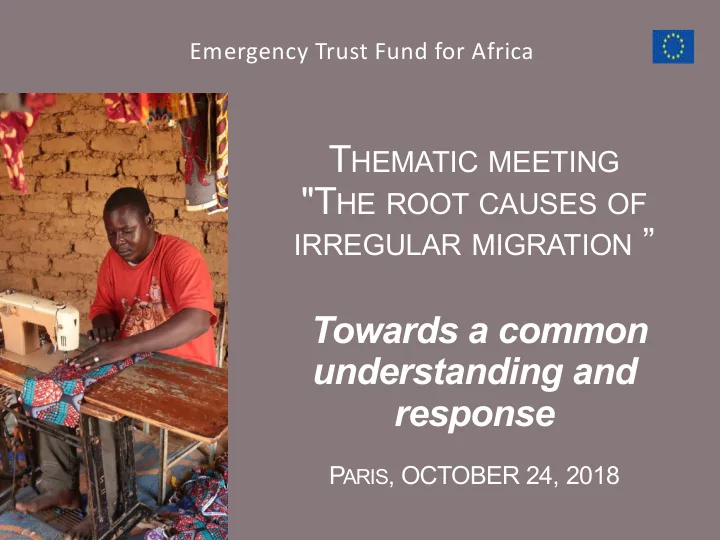

Emergency Trust Fund for Africa T HEMATIC MEETING "T HE ROOT CAUSES OF IRREGULAR MIGRATION ” Towards a common understanding and response P ARIS , OCTOBER 24, 2018
Genesis of FFU Africa Since November 2015, following the Valletta Summit , the EU has embarked on a phase of intense cooperation in the field of migration with its African partners, FFU for Africa, is an instrument dedicated to the common objectives of Europe and Africa for the management of migratory flows and stability, guided by the principles of solidarity, partnership and shared responsibility.
FFU Africa, an emergency instrument • Designed to respond to different dimensions of crises (migration, stability, disasters) • Support stability and help address the root causes of destabilization, forced displacement and irregular migration • Improving living conditions in Africa: Its actions aim to save lives, help people to live in a peaceful and stable environment and to work with dignity.
Priorities of the FFU Africa 1. Provide access to basic services (shelter, food, health care and education) 2. Facilitate migration and mobility of people 3. Contribute to conflict prevention and improved governance of the rule of law to make citizens safer 4. Develop economic opportunities and job creation and foster inclusive growth for all.
FFU Africa: 3 windows, 26 countries
FFU Africa in figures Financial resources of EUR 4.09 billion • EUR 3.7 billion from the EDF + EU budget • EUR 442 million from MS and other donors A total of 165 programs amounting to EUR 3.16 billion approved in all 3 windows End of December 2020
FFU: Simultaneous approach, employment and economic opportunities Strengthen the offer - the employability of young people > Through different types of programmes:TVET, civic education, entrepreneurship, financial literacy Strengthen demand in local SMEs > developing access to credit + access to local and sub-regional markets > developing the role of players along the value chain > Attracting foreign investment in regions of origin of migration (thanks to the support of the diaspora)
FFU - creating sustainable jobs becomes a political priority A new framework set out in the State of the Union address, the priority of the Africa-EU strategic alliance for investment and sustainable employment = 10 million jobs in 5 years 2 examples of ongoing projects PECOBAT in Mauritania YEP in Gambia 1 example of an on-going regional project Archipelago
(1) PECOBAT, Improving the employability of young people and the capacities of SMEs (Mauritania) Implemented by the ILO - 3.2 MEUR > Improvement in youth employability + capacity building of SMEs Through the development of the construction sub-sector in local materials > Establishment of professional and innovative training method, building construction sites and schools Expected Result: 450 people trained + 315 jobs created + 5 schools built
(i) HILP workshop RECOMMENDATIONS Nouakchott 18-19 June 2018 Prerequisites 1. Ensure compliance with working conditions in highly labor-intensive projects (HLIP) with reference to the ILO's decent work agenda in the areas of: occupational safety and health, access to social rights and gender equity. 2. Conduct impact assessments (upstream of public investment on job creation) in terms of cost reduction > In order to convince governments to adopt intensive technologies in employment > Prioritising the use of local materials for the implementation of public investments.
HLIP RECOMMENDATIONS (ii) Selection and treatment of beneficiaries > Facilitate a neutral and fair selection process based on the interest of beneficiaries and also impartiality in the selection process (many candidates and few chosen). Their motivation is also crucial for the rest of their career. Ecosystem conducive to the implementation of Highly labour-intensive projects (HILP) > > Establish a political dialogue between the government, the private sector and workers' organizations (...) > Provide TA and support to companies that are engaged in highly labour intensive project (HLIP) works to enable them to carry out quality work (...)
(2) YEP: Youth empowerment programme (Gambia) Implemented by ITC (International Trade Center) - 11 MEUR FOCUS on: - employability of young people and the FP on the growing (Chambers of Commerce) CoC (agro, ICT , tourism, solar energy) - access to entrepreneurship and micro-credits - promotion of dialogue with the private sector on training needs and the definition of sub- sector roadmap (tourism, cashew nuts and ICT) Lessons: to activate the target audience (= young people), it is necessary to involve them throughout the project in the search for context- sensitive solutions
(3) Archipelago (regional) Implementation by SEQUA, Eurochambres and CPCCAF - 15 MEUR Twin-type programs between EU and Africa / Sahel Chambers of Commerce (requests for proposals from 2019) Establishment of dual training curricula for young people that meet the needs of the private sector and support for the growing CoC (Cambers of Commerce) Expected result: 6000 trained people; the majority absorbed into the labor market Starting: Dec 2018
Emergency Trust Fund of the European Union for Africa https://ec.europa.eu/trustfundforafrica/
Recommend
More recommend